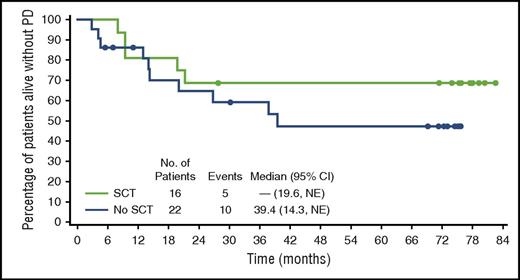In this issue of Blood, Pro et al have reported that it is possible to cure a subset of patients with relapsed or refractory (R/R) systemic anaplastic large cell lymphoma (ALCL) with brentuximab vedotin.1
PFS by SCT status. End-of-study PFS in patients with a best response of CR subset by receipt of consolidative SCT. See Figure 3B in the article by Pro et al that begins on page 2709.
PFS by SCT status. End-of-study PFS in patients with a best response of CR subset by receipt of consolidative SCT. See Figure 3B in the article by Pro et al that begins on page 2709.
The 5-year update of brentuximab vedotin treatment in patients with R/R systemic ALCL demonstrates durable remission with real potential for a cure. Among the 38 patients who obtained a complete response (CR), the median progression-free survival (PFS) had not been reached and at 5 years was 57%.
Approximately 40% to 65% of patients with systemic ALCL develop recurrent disease after first-line therapy.2 At relapse, the disease has historically been resistant to conventional multiagent chemotherapy regimens, and there is no established standard of care. High-dose therapy and autologous stem cell transplantation (SCT) may result in long-term remission in 30% to 40% of patients, but the benefit of autologous SCT is limited to patients with chemotherapy-sensitive disease.3 Even more concerning are patients with primary chemotherapy-refractory disease for whom long-term survival rarely exceeds 15% to 17%.2 Disease recurrence still remains the principal cause of autologous SCT failure, and early disease progression after transplant (ie, within 6 months from high-dose conditioning) is the most important predictor of unfavorable outcome. No standard treatment options exist for patients with disease relapse after autologous SCT or for patients not eligible for autologous SCT, a common issue resulting from unsatisfactory pretransplant cytoreduction and/or the substantial risk of morbidity due to toxicity from previous therapies.
Brentuximab vedotin, an antibody-drug conjugate targeting CD30, may represent the best candidate among the newly developed agents for the treatment of R/R systemic ALCL.4 In fact, systemic ALCL is characterized by the expression of CD30. The favorable activity of this agent in R/R systemic ALCL was clearly documented by Pro et al5 in a phase 2 study involving 58 patients: 86% obtained a response, which was a CR in 57% with a median PFS of 13.3 months. This high response rate was seen in pretreated patients who previously had a poor prognosis and in primary R/R patients. In addition, there was no differences in terms of CR rate between anaplastic lymphoma kinase–negative (ALK–) and ALK+ patients. The same relevant proportion of CR in this subset of patients also emerges from the brentuximab vedotin named patient program experiences across Europe.6-9
Recently, a retrospective large multicenter Italian study of 40 patients with R/R systemic ALCL treated with brentuximab vedotin outside clinical trials shows results similar to those in the pivotal phase 2 study and represents the largest group ever reported in a real-world context.5,10 In the Pro et al 5-year update study, PFS was improved in CR patients who received a consolidative transplant compared with patients without transplant (69% vs 48%) (see figure). These specific data suggest that it is possible to obtain long-term disease control without transplant consolidation and have a real chance of curing a subset of patients with R/R systemic ALCL with brentuximab vedotin only.
Finally, the lengthy follow-up data definitively confirm that patients with systemic ALCL who were treated with brentuximab vedotin have obtained a real long-term clinical benefit. The climax of this story may be forthcoming in the the randomized phase 3 study evaluating the role of brentuximab vedotin in combination with cyclophosphamide, doxorubicin, and prednisone (Echelon-2 trial) vs standard of care in first-line treatment of systemic ALCL.
The study by Pro et al, on the basis of long-term data, demonstrates the pivotal role of brentuximab vedotin as a modality for curing a subset of patients with R/R systemic ALCL.
Conflict-of-interest disclosure: The author declares no competing financial interests.


